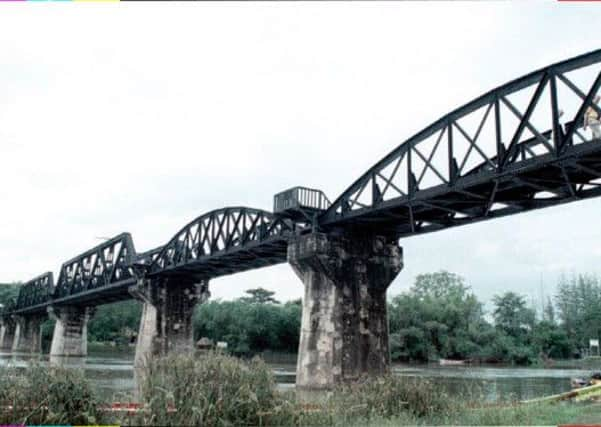POW’s ‘Death Railway’ return


Jim Crossan is among a group of 33 former PoWs, who are nearly all in their 90s, which set off on Monday for the trip to Singapore and Thailand, where they will revisit the Japanese prison camps where they were held during the Second World War.
The trip will also visit the the famous ‘Death Railway’ camp in Thailand, scene of the bridge over the River Kwai, which one of them helped to build, as well as a prisoner of war camp in Singapore.
Advertisement
Hide AdAdvertisement
Hide AdThe group includes six Far East veterans and a number of wives and widows, all accompanied by relatives and assistants.
As well as going back to the scene of their imprisonment, the group will mark Remembrance, attending services in Singapore on Thursday and a service at the Kanchanaburi War Cemetery, close to the River Kwai near the Thailand-Burma Railway Centre, accompanied by the British ambassador on November 11, and will also be hosted by Royal Navy ship HMS Daring during their tour.
The oldest veteran on the tour is Jim, 96, who was a PoW for three-and-a-half years.
Mr Crossan, from Warton, said when he was first asked to go on the trip he said no, but later changed his mind.
Advertisement
Hide AdAdvertisement
Hide Ad“I have no doubt it will be emotional, it will tear my heart-strings,” he said.
But he said part of it would help his son Robin, 61, who is joining him on the trip, to “dot the ‘i’s and cross the ‘t’s” in what he knew about his father’s life.
“My son knows everything about what happened, he is the only one who I ever told,” said Mr Crossan.
“He will be able to see where I was captured, and when we are out there he will know all about everything that happened there. It’s full of interest for him.” Mr Crossan, who served in the Royal Army Service Corps, was captured on February 15, 1942 when it surrendered in Singapore just 10 days after he had arrived.
Advertisement
Hide AdAdvertisement
Hide AdThe Battle of Singapore, from February 8-15, 1942, resulted in the capture of Singapore by the Japanese and the largest surrender of British-led military personnel in history, with around 80,000 British, Indian and Australian troops becoming PoWs, adding to tens of thousands already taking prisoner earlier during the war.
“We arrived more or less in time to be captured,” Mr Crossan said, saying it quickly dawned on them that they had no idea when, or if, they would ever return home.
“We wondered how it would ever end. To begin with there was all sorts of rumours flying around, but these originated to keep morale up.
“You tried not to think about home because you weren’t sure if you would see it again.”
Advertisement
Hide AdAdvertisement
Hide AdHe was moved from Singapore to Thailand on October 1942, where he helped build the Thai-Burma railway - known as the “Death Railway” because of the number of men who died building it.
He was there at the same time as Eric Lomax, about whom a film is due to be released.
Mr Crossan recalls the horror of hearing about men being beaten half to death and witnessing people who were too weak to stand, let alone work.
“I had a great feeling of shame walking past them yet being unable to do anything to help,” he said. “I think the others did too.”
Advertisement
Hide AdAdvertisement
Hide AdHe finally returned in 1945, and found that his then-girlfriend, who was to become his wife, had waited for him, despite not knowing if he would ever return.
“First of all I was posted missing believed a PoW, but she didn’t know whether I was alive or dead. But she still waited for me.
“It was a miracle the two atomic bombs ending the war,” he said. “It ended a lot of misery, and helped those of us who needed to get home.”
Follow us on twitter @The_Gazette and like our page on facebook to keep up with all the latest news.